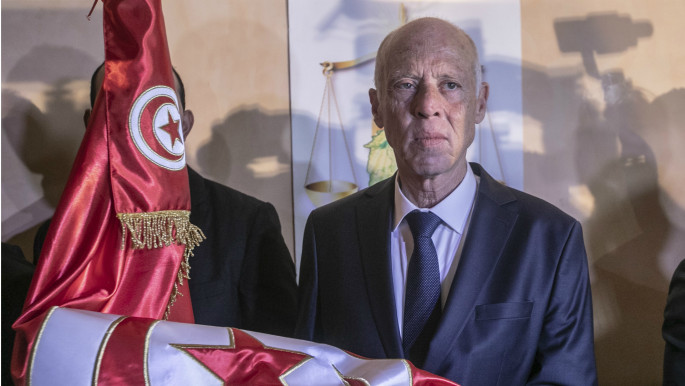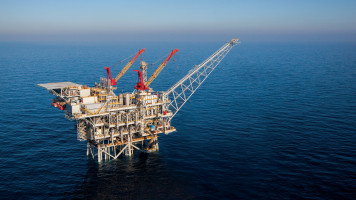
'Temporary' autocracy in Tunisia and wilful ignorance

President Kais Saied’s 25 July autogolpe entailed the suspension of the Tunisian parliament, the sacking of Prime Minister Hichem Mechichi, the imposition of travel bans on various opposition politicians, judges, businessmen, and civil servants, and the deployment of military vehicles outside the parliament and the governmental palace.
Such measures severely escalated the North African country’s political crisis while putting its decade-old democracy on ice. By late September, Saied essentially declared that he will ignore all parts of the constitution that he wants to ignore while ruling by decree.
Then, 11 weeks after the autogolpe, Prime Minister Najla Bouden (whom Saied appointed in late September) named a new government with a cabinet that has an unprecedented number of women serving the body.
In his 11 October speech, Saied vowed to “cleanse the judiciary” and “save the Tunisian state from the clutches of those who lurk at home and abroad, and from those who see their office as booty or as a means to loot public funds.” Bouden promised the Tunisian people that this cabinet would focus on eradicating corruption.
As Dr. Andreas Krieg, associate professor at the School of Security at King's College in London, explained, this is a “new government whose legitimacy is tied to old authoritarian narratives of 'fighting corruption' and 'restoring stability'”.
"It is increasingly clear that the post-revolutionary democratic process in Tunisia is going through a strong setback"
Not all Tunisians have found the president’s power-grab disturbing. On the contrary, Saied is quite popular in his country. Tunisia’s head of state maintains that his power-grab has been in the country’s national security interests and that he is fully committed to defending the rights of Tunisians. Saied’s supporters credit him with taking actions deemed necessary to combat corruption and fix the Tunisian economy.
Many inside and outside the North African country have been urging all to ‘wait and see’ what Saied does with his recently obtained dictatorial powers. Many claim it is too early to know whether he wants to establish one-man rule or preserve democracy.
But is there wilful ignorance on the part of those claiming to not yet know Saied’s political aims? Some experts believe so.
“Saied has been telling us clearly what he wants to do since the 2019 presidential election and before,” Dr. William Lawrence, a professor of political science at the American University in Washington, told The New Arab.
“He definitely has a political agenda. The coup was just the first dramatic step in seizing all power in order to implement that agenda. He will go as far as Tunisians and the international community let him go. That’s the only question. I don’t think the question is what he wants. It’s a question about what people let him do.”
|
|
Saied’s ambitions entail establishing a “Jamahiriya type system - a certain populist system, where all local power goes to a single local official who has no affiliation except presumably to [Saied],” according to Dr. Lawrence, a former US diplomat at the State Department’s Tunisia desk who described the future which Saied desires.
This rests on a vision for a Tunisia without political parties or checks and balances while all executive powers combined with considerable judicial and legislative powers are concentrated in the president’s hands, at least for the foreseeable future.
“It’s very easy looking at his speeches and statements to see what he wants to do, and how the declarations of late September are an articulation of what he wants for Tunisia…It’s clear that the modus operandi of Saied is working with whoever is agreeing with him rather those disagreeing with him. That’s going to bode badly for civil liberties for the short, medium, and long term.”
Although some analysts see Saied’s consolidation of power as being about various temporary steps towards an unknown future, Dr. Lawrence asserted that “instead what we’re seeing are temporary steps towards a known future which is just an extension of those very decrees…What he is decreeing is his vision for Tunisia, not a way to get to his vision for Tunisia, where the powers are entirely concentrated in his hands and later those of his supporters.”
If Saied begins ruling with more of an iron fist and his government becomes more authoritarian, there are valid concerns about a further curtailing of rights and the crackdown on dissent becoming harsher.
“It is increasingly clear that the post-revolutionary democratic process in Tunisia is going through a strong setback,” Dr. Giuseppe Dentice, the head of the MENA Desk at the Center for International Studies and teaching assistant at the Catholic University of the Sacred Heart in Milan, told TNA. “The numerous arrests strongly connoted at a political level are a cause for concern.”
Two days after Saied’s autogolpe, he dismissed and replaced the head of Military Courts. Later he put various figures - including Seifeddine Makhlouf (a lawmaker who heads the Al-Karama party), Mohamed Affas (an Al-Karama lawmaker), Mehdi Zagrouba (a lawyer), Yassine Ayari (an independent deputy and former blogger), Abdel-Latif el-Aloui (an Al-Karama lawmaker), and Amer Ayyad (a Al-Zaytouna TV broadcaster) - before military, not civil, courts.
“None of these individuals are businessmen nor are they perceived in public opinion as being associated with corruption,” Sami Hamdi, the managing director of International Interest, a London-based global risk consultancy, told TNA. “What these individuals have in common instead is their public denouncement of Saied’s decisions.”
Because Saied has not consulted the Parliament Speaker and Prime Minister about extending the emergency period while not unfreezing the Parliament, Saied is clearly violating Article 80 of the Tunisian constitution, which he used to try to justify his actions. According to Hamdi, “Saied’s circumvention of the law, and his crackdown on opposition figures suggests that the stronger he becomes, the tighter the noose will become on opposition.”
"This is a new government whose legitimacy is tied to old authoritarian narratives of 'fighting corruption' and 'restoring stability'”
Ennahda's major crisis
Undermined greatly by the president’s power-grab and its own divisions, where does Ennahda find itself today in Tunisia? Saied and his allies may act against Ennahda by dissolving the party and perhaps banning it from Tunisia’s political arena. Ennahda might go back underground, where they were from 1989 until 2011.
“Senior figures in Ennahda are feeling the pressure and concerned that as Saied becomes stronger, the more likely it is that they will be arbitrarily detained, tried, and imprisoned in the same manner that many were in the Ben Ali years,” explained Hamdi. “This is why some senior figures have sought to openly disassociate themselves from Ennahda’s leader Rachid Ghannouchi.”
Upset at Ennahda’s leadership for not taking stronger actions against the president’s power-grab, approximately 113 members of the party resigned last month. Their grievance is that those leading the party failed to respond to the autogolpe with sufficient strength.
Thus, Ennahda has a divide between, on one hand, those in the party who felt it was most reasonable to quit because of Ennahda’s leadership not taking enough of an anti-coup stance and, on the other hand, members who believed that the party’s internal rifts needed to be addressed later, after a successful defence of Tunisian democracy.
Assuming Saied excludes the moderate Islamist party from any “national dialogue”, which would be expected to include the political parties that backed the 25 July autogolpe, it would be important to see if Ennahda grows more united. The “national dialogue” would presumably be part of the president’s effort to negotiate certain reforms within Tunisia among those that have agreed with his power-grab and present the West with an image of the country’s political crisis being resolved.
|
|
At least for now, this “national dialogue” remains unconfirmed. There were suggestions that this was Saied’s intention to Paris, yet it is unclear whether the Tunisian president was serious or just attempting to mollify French officials.
Dr. Lawrence predicts that despite the autogolpe, Ennahda will continue playing an important role in Tunisian politics even if forced into the opposition. “Being in the opposition is not going to weaken Ennahda,” he asserted.
“That’s probably going to re-strengthen it because they’ll take stronger positions. But right now, Ennahda’s main position is about preserving democracy. Whether you’re in the camp that quit, which wanted a stronger action in defence of democracy, or the camp that’s staying in because they think that internal rifts and disagreements within Ennahda should be left for later after the democratic system has been defended - I don’t think is as big of an issue as had been made of it because ultimately both camps are both trying to defend democracy, just in different ways.”
Hamdi agrees and warns against exaggerating the party’s divisions. “It should be noted that aside from two or three big names, Ennahda’s main leadership corps remains intact,” which implies that within Ennahda’s ranks there is a belief that the party can “ride out this storm and that Saied’s bid for power could still backfire.”
Ignoring the warnings
For good reason, many voices are concerned about the post-2011 democratic gains achieved by Tunisians. Instead of embracing pluralism and consensus building, Saied is marginalising and excluding from Tunisia’s decision-making processes all who disagree with his autocratic vision. The president is engaged in tactics of intimidation rather than trying to foster dialogue with diverse organisations and individuals across Tunisia’s political spectrum.
“There’s no national debate,” said Dr. Lawrence. “There’s no discussion. Saied has stopped talking to most Tunisians and their organisations and mostly just talks to allies and to foreign delegations, to assure the latter that they misunderstand what’s going on when it’s obvious what’s going on. He’s not consensus building. It’s a pretty sad commentary on decades of work by Tunisians to win and then build a democratic system, to have it morph into that Napoleonic power-grab.”
“There’s this sort of vague faith in the street that since the street could bring down a regime in 2011, the street can bring down Saied if he goes too far, which is exactly what the Egyptians were saying in 2013 when Sisi came to power,” Dr. Lawrence told TNA.
“Egyptian activists have been warning Tunisians since 25 July, but most Tunisians aren’t listening.”
Giorgio Cafiero is the CEO of Gulf State Analytics.
Follow him on Twitter: @GiorgioCafiero




